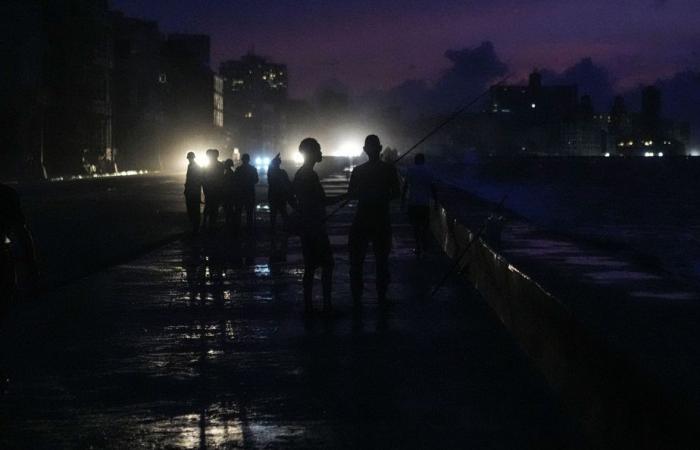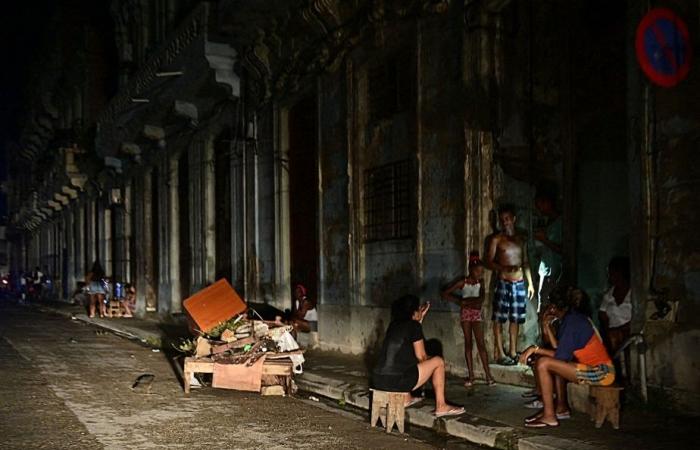(Havana) Cuba tried Friday evening to restore its electricity system, paralyzed by a giant blackout which plunged its 10 million inhabitants into darkness.
Updated yesterday at 10:07 p.m.
Jordane BERTRAND
Agence France-Presse
“There will be no respite” until the service is “fully restored,” President Miguel Díaz-Canel declared Friday evening during a crisis meeting, broadcast by state television. Cuba is going through an “energy emergency,” he admitted.
“The system is without electricity throughout the country”, after the shutdown of the Antonio Guiteras thermal power station, in the center-west of the country, announced at midday on state television Lazaro Guerra, general director of electricity at the Ministry of Energy and Mines. Mr. Guerra said that when the power plant shut down “the system collapsed,” causing a giant blackout.
As night fell, Havana’s wide avenues were plunged into darkness, with the exception of points of light provided by certain hotels, hospitals and a few private restaurants or bars that could run generators, AFP noted.
“We are going through a terrible situation with this breakdown,” says Betsabe Valdes, 40, on the verge of tears, who came to get some fresh air on an avenue in central Havana to avoid the heat of her apartment.
PHOTO ADALBERTO ROQUE, AGENCE FRANCE-PRESSE
Cubans talk in Havana, October 18, 2024.
“We don’t have gas, we don’t have electricity, life is difficult because we have a little girl,” she adds, pointing to her one-year-old niece. “Children and the elderly are those who suffer the most,” she continues.
On Thursday, the Cuban president announced that Cuba was in a situation of “energy emergency” faced with difficulties in purchasing the fuel necessary to power its power stations, due to the strengthening of the embargo that Washington is imposing on the island. communist since 1962.
“It is yet another demonstration of all the problems that the blockade is causing us,” he insisted Friday evening.
« Aberrant », « terrible »
“It’s absurd,” said Eloy Font, an 80-year-old retiree living in central Havana. “This demonstrates the fragility of our electricity system […] there are no reserves, there is nothing to keep this country on its feet, we live from day to day,” he railed.
For three months, Cubans have suffered from recurring power cuts that have become more and more frequent. On Thursday, the national energy deficit, which hovered around 30%, reached 50%, reinforcing the exasperation of the population.
“Two days ago I could barely work and now what am I going to do? It’s terrible to live like this, in 47 years, I haven’t seen anything worse,” laments Barbara Lopez, digital content creator.
Classes were suspended at all levels in the country until Monday, and all entertainment venues were closed.
Obsolete
The first restrictions date back to March, with the government’s increasing difficulties in sourcing fuel and parts needed to operate and repair the country’s aging thermoelectric power plants.
In recent weeks in several provinces, outages have lasted more than 20 hours a day.
On Thursday, Prime Minister Manuel Marrero announced the suspension of all non-essential public services in order to prioritize the supply of electricity to hospitals, businesses and homes.
On the island, electricity is produced from eight dilapidated thermal power plants, sometimes broken down or under maintenance, as well as several floating power plants, which the government rents to Turkish companies, and generators.
Most of this infrastructure requires fuel to operate.
The island is currently experiencing its worst crisis in three decades, with shortages of food and medicine and chronic power cuts.
Power cuts were one of the triggers of the unprecedented anti-government protests of July 11, 2021. In September 2022, the island had already experienced a widespread blackout after the passage of the hurricane Ian which had struck the west of the island.







